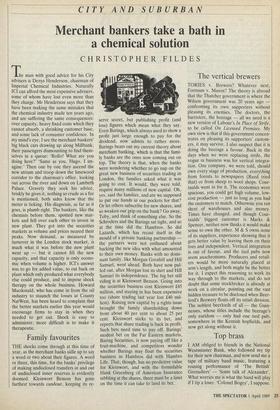The vertical brewers
TORIES v. Brewers? Whatever next, Fortnum v. Mason? The theory is abroad that the Thatcher government is where the Wilson government was 20 years ago confronting its own supporters without pleasing its enemies. The doctors, the barristers, the beerage — all we need is a new version of Labour's In Place of Strife, to be called On Licensed Premises. My own view is that if this government concen- trates on pleasing its supporters' custom- ers, it may survive. I also suspect that it is doing the beerage a favour. Back in the days when we were replacing strife, the vogue in business was for vertical integra- tion. One company, we were told, should own every stage of production, everything from forests to newspapers (Reed tried that) or from sheep to wool shops. Cour- taulds went in for it. The economics were spacious, you could get high volume, low- cost production — just so long as you had the customers to match. Otherwise you ran short of warehouses and also money. Times have changed, and though Cour- taulds' biggest customer is Marks & Spencer, neither now thinks it would make sense to own the other. M & S owns none of its suppliers, experience showing that it gets better value by leaving them on their toes and independent. Vertical integration is out of favour, and the tied pubs now seem anachronisms. Producers and retail- ers would be more naturally placed at arm's length, and both might be the better for it. I expect this reasoning to work its way through to the markets, and do not doubt that some stockbroker is already at work on a circular, pointing out the vast hidden treasure to be disclosed when Beer- lord's Brewery floats off its retail division. The noblest beerlords of all — the Guin- nesses, whose titles include the beerage's only earldom — only had one tied pub, somewhere in the Kentish hopfields, and now get along without it.


















































 Previous page
Previous page